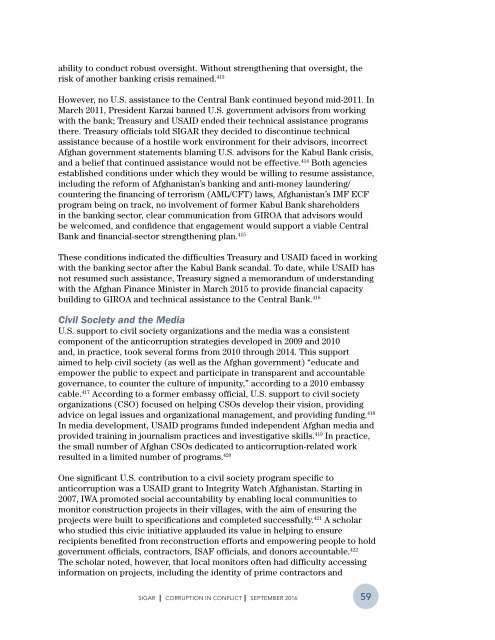CORRUPTION IN CONFLICT
5IlaWjQej
5IlaWjQej
Create successful ePaper yourself
Turn your PDF publications into a flip-book with our unique Google optimized e-Paper software.
ability to conduct robust oversight. Without strengthening that oversight, the<br />
risk of another banking crisis remained. 413<br />
However, no U.S. assistance to the Central Bank continued beyond mid-2011. In<br />
March 2011, President Karzai banned U.S. government advisors from working<br />
with the bank; Treasury and USAID ended their technical assistance programs<br />
there. Treasury officials told SIGAR they decided to discontinue technical<br />
assistance because of a hostile work environment for their advisors, incorrect<br />
Afghan government statements blaming U.S. advisors for the Kabul Bank crisis,<br />
and a belief that continued assistance would not be effective. 414 Both agencies<br />
established conditions under which they would be willing to resume assistance,<br />
including the reform of Afghanistan’s banking and anti-money laundering/<br />
countering the financing of terrorism (AML/CFT) laws, Afghanistan’s IMF ECF<br />
program being on track, no involvement of former Kabul Bank shareholders<br />
in the banking sector, clear communication from GIROA that advisors would<br />
be welcomed, and confidence that engagement would support a viable Central<br />
Bank and financial-sector strengthening plan. 415<br />
These conditions indicated the difficulties Treasury and USAID faced in working<br />
with the banking sector after the Kabul Bank scandal. To date, while USAID has<br />
not resumed such assistance, Treasury signed a memorandum of understanding<br />
with the Afghan Finance Minister in March 2015 to provide financial capacity<br />
building to GIROA and technical assistance to the Central Bank. 416<br />
Civil Society and the Media<br />
U.S. support to civil society organizations and the media was a consistent<br />
component of the anticorruption strategies developed in 2009 and 2010<br />
and, in practice, took several forms from 2010 through 2014. This support<br />
aimed to help civil society (as well as the Afghan government) “educate and<br />
empower the public to expect and participate in transparent and accountable<br />
governance, to counter the culture of impunity,” according to a 2010 embassy<br />
cable. 417 According to a former embassy official, U.S. support to civil society<br />
organizations (CSO) focused on helping CSOs develop their vision, providing<br />
advice on legal issues and organizational management, and providing funding. 418<br />
In media development, USAID programs funded independent Afghan media and<br />
provided training in journalism practices and investigative skills. 419 In practice,<br />
the small number of Afghan CSOs dedicated to anticorruption-related work<br />
resulted in a limited number of programs. 420<br />
One significant U.S. contribution to a civil society program specific to<br />
anticorruption was a USAID grant to Integrity Watch Afghanistan. Starting in<br />
2007, IWA promoted social accountability by enabling local communities to<br />
monitor construction projects in their villages, with the aim of ensuring the<br />
projects were built to specifications and completed successfully. 421 A scholar<br />
who studied this civic initiative applauded its value in helping to ensure<br />
recipients benefited from reconstruction efforts and empowering people to hold<br />
government officials, contractors, ISAF officials, and donors accountable. 422<br />
The scholar noted, however, that local monitors often had difficulty accessing<br />
information on projects, including the identity of prime contractors and<br />
SIGAR I <strong>CORRUPTION</strong> <strong>IN</strong> <strong>CONFLICT</strong> I SEPTEMBER 2016<br />
59


